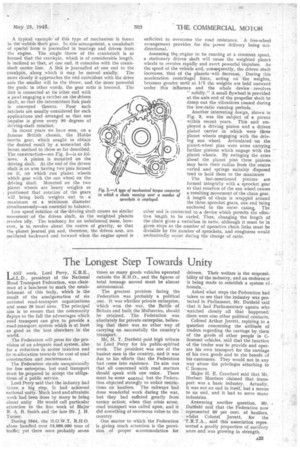The Longest Step Towards Unity
Page 25

If you've noticed an error in this article please click here to report it so we can fix it.
LAST week, Lord Perry, K.B.E., LL.D., president of the National Road Transport Federation, was chairman at a luncheon to mark the establishment of this body, which is the result of the amalgamation of six national road-transport organizations and some 20 local ones. The principal aim is to ensure that the community &joys to the full the advantages which road transport can give to provide a road-transport system which is at least as good as the best elsewhere in the world,
The Federation will press for the provision of an adequate road system, also for a reduction in motor taxation and its re-allocation towards the cost of road construction and maintenance.
The Federation stands unequivocally for free enterprise, but road transport must be prepared to accept the obligations of a public service.
Lord Perry said that the industry had taken a big step. It had achieved national unity. Much bard and altruistic work had been done by many to bring about unity He would call particular attention to the fine work of Major R. A. B. Smith and the late Mr. J. H. Turner,
During 1944, the M.O.W.T. R.H.O. alone handled over 53,000,000 tons of traffic; yet there were probably seven times as many goods vehicles operated outside the R.H.O., and the figures of total .tonnage moved must be almost astronomical.
The greatest problem facing the Federation was probably a political one. It was whether private enterprise, which won the war, the Battle of Britain and built the Mulberries, should be retained. The Federation was absolutely for private enterprise, believing that there was no other way of carrying on successfully the country's transport.
Mr. H. T. Dutfield paid high tribute to Lord Perry for his public-spirited work. The president was one of the busiest men in the country, and it was due to his efforts that the Federation had come into existence. Its aim was that all concerned with road matters should speak with one voice.. There must be some control but the Federation objected strongly to unfair restrictions on hauliers. The railways had done wonderful work during the war, but they had suffered greatly from enemy action; when that crisis arose, road transport was called upon, and it did something of enormous value to the country.
One matter to which the Federation is giving much attention is the provision of proper accommodation for
drivers. Their welfare is the responsibility of the industry, and an encleavoar is being made to establish a system cf hostels.
Asked what steps the Federation had taken to see that the industry was protected in Parliament, Mr. Dutfield raid that it had Parliamentary agents who watched closely all that happened; there were also other political contacts.
Colonel Arthur Jerrett, replying to a question concerning the attitude of traders regarding the carriage by them of the goods of other people in Clicensed vehicles, said that the function of the trader was to provide and operate his own transport for the carriage of his own goods and to the benefit of his customers. They would not in any way abuse the privileges attaching to C licences.
Major H. E. Crawfurd said that Mr. Herbert Morrison claimed that transport was a basic industry. Actually, it was not an end in itself, but a means to an end, and it had to serve many industries.
Answering another question, Mr. Duffield said that the Federation now represented 60 per cent, of hauliers, whilst Colonel Jerrett, for the T.R.T.A., said this association represented a goodly proportion of ancillary users and was growing in strength.




















































